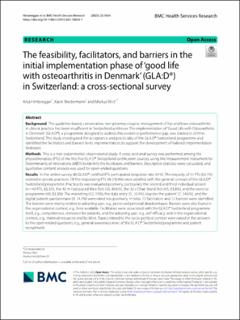Please use this identifier to cite or link to this item:
https://doi.org/10.21256/zhaw-28815| Publication type: | Article in scientific journal |
| Type of review: | Peer review (publication) |
| Title: | The feasibility, facilitators, and barriers in the initial implementation phase of 'good life with osteoarthritis in Denmark' (GLA:D®) in Switzerland : a cross-sectional survey |
| Authors: | Hinteregger, Anja Niedermann Schneider, Karin Wirz, Markus |
| et. al: | No |
| DOI: | 10.1186/s12913-023-10023-7 10.21256/zhaw-28815 |
| Published in: | BMC Health Services Research |
| Volume(Issue): | 23 |
| Issue: | 1034 |
| Issue Date: | 2023 |
| Publisher / Ed. Institution: | BioMed Central |
| ISSN: | 1472-6963 |
| Language: | English |
| Subjects: | Exercise therapy; Feasibility; Health education; Implementation; Non-surgical management; Osteoarthritis; Survey; GLAD |
| Subject (DDC): | 615.82: Physical therapy 616.7: Diseases of musculoskeletal system and orthopaedics |
| Abstract: | Background: The guideline-based, conservative, non-pharmacological management of hip and knee osteoarthritis in clinical practice has been insufficient in Switzerland until now. The implementation of “Good Life with Osteoarthritis in Denmark” (GLA:D®), a programme designed to address this evidence-performance gap, was started in 2019 in Switzerland. This study investigated the acceptance and practicality of the GLA:D® Switzerland programme and identified the facilitators and barriers to its implementation, to support the development of tailored implementation strategies. Methods: This is a non-experimental observational study. A cross-sectional survey was performed among the physiotherapists (PTs) of the first five GLA:D® Switzerland certification courses, using the Measurement Instrument for Determinants of Innovations (MIDI) to identify the facilitators and barriers. Descriptive statistics were calculated, and qualitative content analysis was used for open-ended questions. Results: In the online survey, 86 GLA:D® certified PTs participated (response rate: 61%). The majority of 51 PTs (63.7%) worked in private practices. Of the responding PTs 58 (78.4%) were satisfied with the general concept of the GLA:D® Switzerland programme. Practicality was evaluated positively, particularly the second and third individual session (n = 40 PTs, 83.3%), the 40 m Fast-paced Walk Test (43, 89.6%), the 30 s Chair Stand Test (45, 93.8%), and the exercise programme (40, 83.3%). The marketing (12, 15%), the ‘data entry’ (5, 10.4%), ‘register the patient’ (7, 14.6%), and the digital patient questionnaire (9, 14.2%) were rated less positively. In total, 12 facilitators and 12 barriers were identified. The barriers were mainly related to adopting user, e.g., perceived personal disadvantages. Barriers were also found in the organisational context, e.g., time available. Facilitators were associated with the GLA:D® Switzerland programme itself, e.g., completeness, relevance for patients, and the adopting user, e.g., self-efficacy, and in the organisational context, e.g., material resources and facilities. Topics related to the socio-political context were raised in the answers to the open-ended questions, e.g., general awareness level of the GLA:D® Switzerland programme and patient recruitment. Conclusion: The acceptance, practicality and facilitators identified from the initial implementation are encouraging. However, the identified barriers and activities rated with low practicality require tailored strategies to support a successful implementation of the GLA:D® Switzerland programme. |
| URI: | https://rdcu.be/dncKV https://digitalcollection.zhaw.ch/handle/11475/28815 |
| Fulltext version: | Published version |
| License (according to publishing contract): | CC BY 4.0: Attribution 4.0 International |
| Departement: | School of Health Sciences |
| Organisational Unit: | Institute of Physiotherapy (IPT) |
| Published as part of the ZHAW project: | GLAD Arthrose Schweiz |
| Appears in collections: | Publikationen Gesundheit |
Files in This Item:
| File | Description | Size | Format | |
|---|---|---|---|---|
| 2023_Hinteregger-etal_Feasibility-facilitators-barriers-initial-implementation-phase-GLAD_BMC.pdf | 1.79 MB | Adobe PDF |  View/Open |
Show full item record
Hinteregger, A., Niedermann Schneider, K., & Wirz, M. (2023). The feasibility, facilitators, and barriers in the initial implementation phase of ‘good life with osteoarthritis in Denmark’ (GLA:D®) in Switzerland : a cross-sectional survey. BMC Health Services Research, 23(1034). https://doi.org/10.1186/s12913-023-10023-7
Hinteregger, A., Niedermann Schneider, K. and Wirz, M. (2023) ‘The feasibility, facilitators, and barriers in the initial implementation phase of “good life with osteoarthritis in Denmark” (GLA:D®) in Switzerland : a cross-sectional survey’, BMC Health Services Research, 23(1034). Available at: https://doi.org/10.1186/s12913-023-10023-7.
A. Hinteregger, K. Niedermann Schneider, and M. Wirz, “The feasibility, facilitators, and barriers in the initial implementation phase of ‘good life with osteoarthritis in Denmark’ (GLA:D®) in Switzerland : a cross-sectional survey,” BMC Health Services Research, vol. 23, no. 1034, 2023, doi: 10.1186/s12913-023-10023-7.
HINTEREGGER, Anja, Karin NIEDERMANN SCHNEIDER und Markus WIRZ, 2023. The feasibility, facilitators, and barriers in the initial implementation phase of ‚good life with osteoarthritis in Denmark‘ (GLA:D®) in Switzerland : a cross-sectional survey. BMC Health Services Research [online]. 2023. Bd. 23, Nr. 1034. DOI 10.1186/s12913-023-10023-7. Verfügbar unter: https://rdcu.be/dncKV
Hinteregger, Anja, Karin Niedermann Schneider, and Markus Wirz. 2023. “The Feasibility, Facilitators, and Barriers in the Initial Implementation Phase of ‘Good Life with Osteoarthritis in Denmark’ (GLA:D®) in Switzerland : A Cross-Sectional Survey.” BMC Health Services Research 23 (1034). https://doi.org/10.1186/s12913-023-10023-7.
Hinteregger, Anja, et al. “The Feasibility, Facilitators, and Barriers in the Initial Implementation Phase of ‘Good Life with Osteoarthritis in Denmark’ (GLA:D®) in Switzerland : A Cross-Sectional Survey.” BMC Health Services Research, vol. 23, no. 1034, 2023, https://doi.org/10.1186/s12913-023-10023-7.
Items in DSpace are protected by copyright, with all rights reserved, unless otherwise indicated.